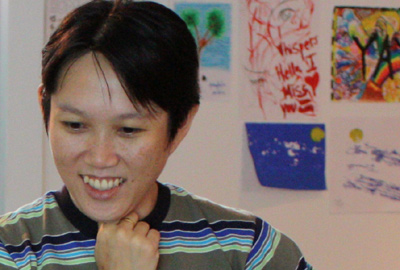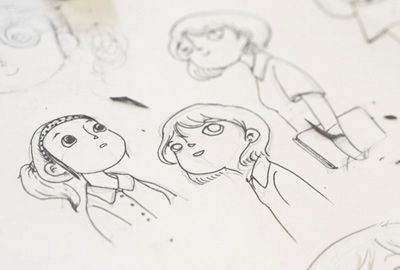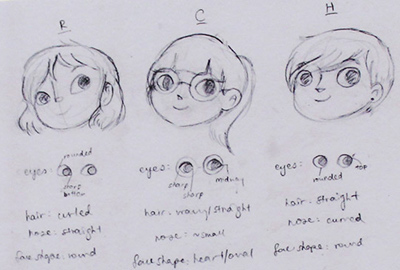Sex education is a messy business in Singapore. Students get some info on contraception and abortion, but the Ministry of Education still insists on promoting the ideal of abstinence until marriage. Worse still, any questions about homosexuality are answered by reminding kids that it’s against the law.
What really bothers Felicia Low, however, is how little time educators spend talking about love and relationships – “the softer areas of sexuality”, she calls them. As a former teacher, she’s witnessed how educators prefer to stick to the scientific facts of reproduction rather than touching on matters of the heart.

Felicia Low
Now, the 36-year-old artist has decided to tackle this problem by putting together The School Never Asked: a comic book for students, exploring the themes of love, sexuality and growing up. The content’s based on a series of interviews with three young women: one straight, one bisexual and one lesbian.
“I want to bring out their experiences for other students, to show [that teen emotional problems are] not the end of the world, that they’re not a struggle that will never end,” she says. “Other girls have been through this. So don’t worry. It’s all right.”
Last weekend, she exhibited the work-in-progress at the Substation, which is funding the project as part of its Associate Artist in Residence Programme. If all goes as planned, the final product will be ready for viewing by June 2013.
Art for the community
Felicia’s well known as a practitioner of “community art”. In the past, she’s created collaborative projects to empower and stimulate dialogue among marginal groups: the elderly, at-risk youth, people with Down’s syndrome, transgender sex workers and so on. This project focuses on yet another such group: young people in the Normal (Technical) stream. [For the less academically inclined, students can take subjects of a more technical nature, such as Design and Technology.]
Singapore’s education system divides kids into four “streams”, based on their exam results. As the folks in the lowest-ranking stream, the Normal (Technical) kids have a bad reputation – they’re supposed to be out of control, the worst kids you could ever be burdened with.
Having taught these kids, however, Felicia’s seen a different side of them. She’s been struck by their passion: how full of questions they are, how resourceful they are when learning to cope with the challenges of the real world. Most of them don’t read books, which she thinks is a pity – “These media materials help them to hold a mirror to themselves,” she says. They’re keener to do their learning outside the classroom – and that includes learning about love.


Above: Comic drawings
This is why she’s chosen three interviewees, R, C and H, who’re former Normal (Technical) students. All three are 24 years old, mutual friends, and rather happy with the way their lives are headed. Respectively, they’re a married bisexual artist, a straight assistant accountant and a prospective fishball noodle hawker.
They’ve been asked four questions: How did they fall in love? How did they find out about sex and sexuality? What were the most reckless things and the most responsible things they’d ever done? And what did they see in their futures? In response, they’ve shared eye-popping tales of their school days. The comic’s filled with sketches of the girls shoplifting, watching pornographic videos at home and on their classmates’ cellphones and passing around illegal Taiwanese erotic comics.
Felicia says she’s tried to avoid dividing the experiences according to sexual orientation. “My strategy for that was to show an over-arcing life situation. All three of them went through the same experiences, regardless of whichever gender they loved. How did they fall in love? How did they tell their parents? That to me was most important.”
Naturally, the theme of homophobia has been relevant at times. H described how nervous she was about coming out to friends. Both R and H also mentioned how they had to stay alert when they went on dates with girls, just in case a family member was out and about.
On the other hand, the straight girl, C, is the only one of the three who’s never been in a relationship. “If you ask me who has the most difficult life, I can’t say the heterosexual has the least difficult life,” Felicia admits.
By young people, for young people
There’s another key collaborator in this project. Her name’s Joy Abigail Ho, and she’s the illustrator of the comic. She’s just 19 years old, and she was recruited for this project last November, when she’d just graduated from the School of the Arts.
Her youth’s actually been an advantage in her work. She’s comfortably familiar with the world of adolescence in The School Never Asked. But, her life’s been pretty sheltered, so she’s learning a lot. In her words: “It’s just the right balance between what I know and what I don’t know.”
Come June, the finished comic will be uploaded onto a website and released as a smartphone app. Felicia’s determined that this is the best way to reach Normal (Technical) students, who’re incredibly tech-savvy but would never dream of going into a physical bookstore.
“The more I think about it, the more I think that traditional publishing is the wrong route,” she explains. “I’d rather make good photocopies and stand outside the school and hand them out.”
Whatever form the comic takes, she hopes that kids will start distributing these materials secretly, widening their minds far beyond the scope of the sex ed classes. We share that hope. The next generation deserves better.
For more information about The School Never Asked, visit the Substation’s webpage on the exhibition, visit substation.org/the-school-never-asked.
